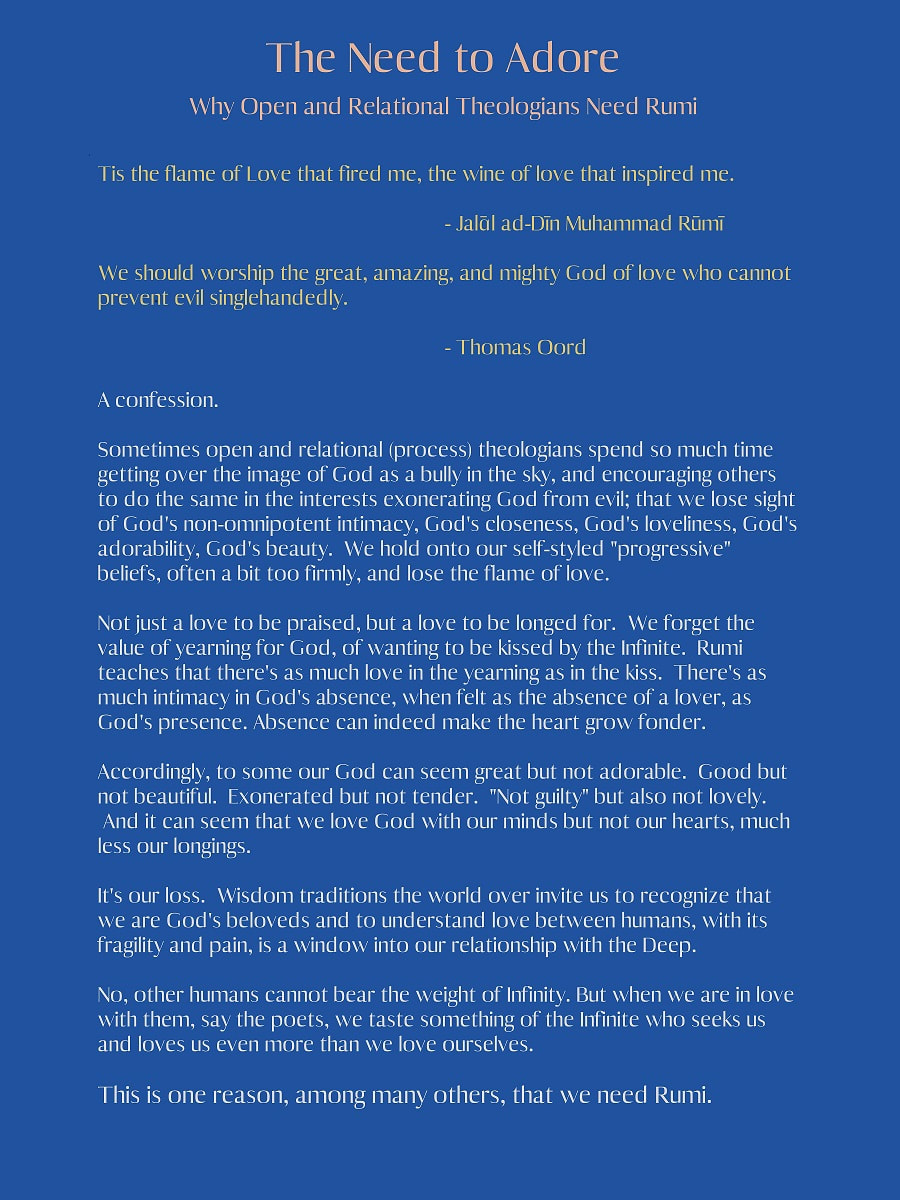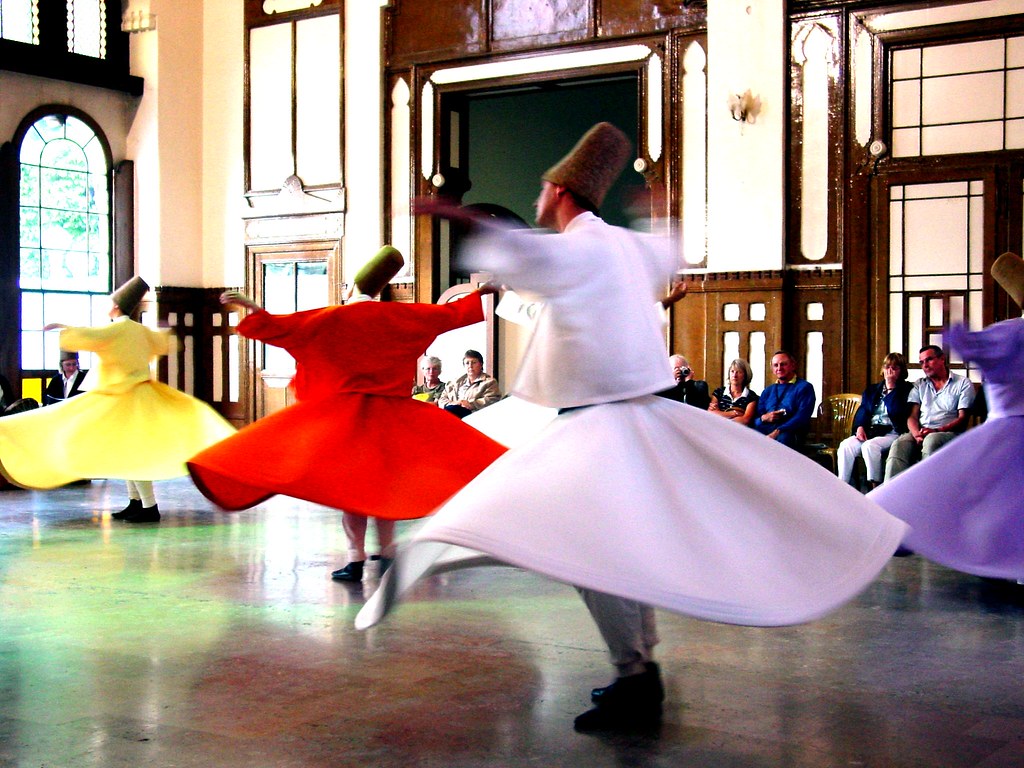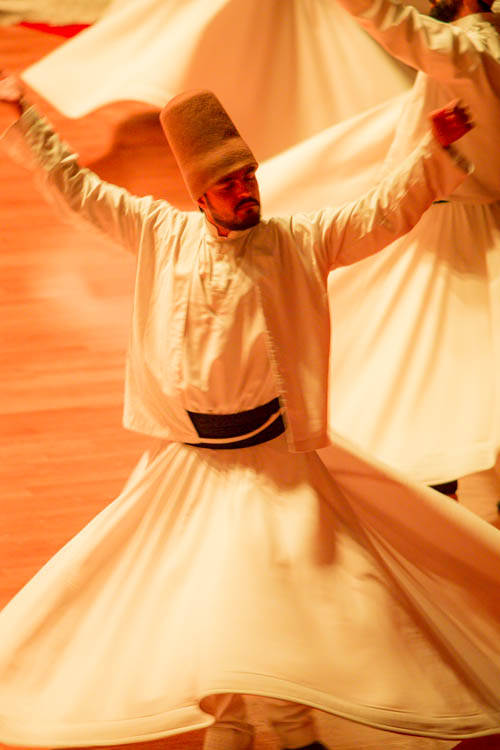- Home
- Process Worldview
- Community
- Art and Music
- Whitehead and Process Thinking
- Podcasts
- Spirituality
- Ecological Civilization
- Education
- Contact
- Social Justice
- Science
- Animals
- Sacred Poems
- Whitehead Videos
- Index of All Titles
- Practicing Process Thought
- Process Spirituality: A Spiritual Alphabet
- Recent Posts
Rumi and Charles Hartshorne
|
Jal al-Din Rumi
Rumi invites us to love God with our hearts. He was a Sufi poet. He believes that God is Love's Embrace. From Rumi's perspective we are reeds torn from a reedbed who seek to return to the ground from which we emerged. We are drawn to the ground as a moth to a flame, or a lover to a beloved. Being drawn to something -- wanting to be near something -- has an intimacy of its own. And the experience of this intimacy often requires the absence of the beloved. Think of a lost child, or a lost friend, or a lost lover. Muslims speak of the nearness of God as tashbih and the distance of God as tanzih. The idea that God is tanzhih -- distant -- reminds us that God is always more than our concept of God. The distance is epistemic. And the idea that God is tasbhih reminds us that God is closer to us than our jugular veins. Part of the wisdom of Islam is to hold these two together, without forgetting either. When we long for God as we might long for a lost lover, we are experiencing both the nearness and the distance in a deeply personal way. We long for the person and somehow the person is present in the longing. Indeed the love is intensified by the absence. Sometimes there is more love in not being in the presence of one you love than in being in their presence. Call it the longing side of love. Rumi invites us to long for God. The Need to Adore But longing is not the whole story. Love also includes moments of ecstasy. You look into a person's eyes -- a lover, for example -- and they seem so wide and wild. You want to melt into them. It's almost like fainting. It's the swooning side of love. Without a capacity for swooning, we cannot find our own hearts. The impulse to melt into God -- to swoon -- has wisdom in it, too. When you melt into another's eyes, you do not die literally but you do die psychologically. You lose the sense of being a separate self and fall into a moment of pure adoration. The one who is adored -- the beloved -- becomes a window through whom a deeper light shines: the light of the divine Beloved. Or course we ought not confuse the window with the Light. No human being can bear the burden of infinity. If we make idols of those we love, turning them into objects of possession or, alternatively, finite masters of our destiny, we miss the Beloved whose light shines through them. We lose the light if we cling to the window. But if we recognize that the one we love is indeed a vessel through whom the Light shines, and if we place our trust in the Light, then the love relationship itself can be a holy icon, not an idol. We find God through the love. Listen to Rumi. Or to the song of the reed. |
Charles Hartshorne
Charles Hartshorne invites us love God with our minds. He was a process philosopher. He believes that God is Love's Embrace. From Hartshorne's perspective we are moments of becoming in a deeper Becoming who is the adventure of the universe as one. This deeper Becoming is the very heart of perfection, but the perfection is not static. It is a perfection of love, and love's perfection is always moving, always responsive, always adapaptive, always inclusive. It is relational and thus relative. Love's perfection is divine relativity. It is like a spiral in which we are always already enfolded, which is both immanent within our souls and more than everything added together. In love's perfection the many becomings of the universe are always being gathered into an embrace. We do not need to live forever in order to be part of the embrace. We can accept our mortality and that of others. In dying we make space for others. This embrace is the glory of God. This glory is an ongoing activity of remembering everything that has ever happened, and carrying its memory into a future without end. The glory of God is timeless in its quality but deeply temporal in its actuality. It includes the many of the universe and the oneness of divine love. The birds art part of the glory; the oceans are part of the glory; the stars are part of the glory; and we, too, are part of the glory. This does not mean that everything we do is good. We harm ourselves and others, sometimes in terrible ways. Our sin is not glorious. It is anti-glory. Our sin causes pain in the very adventure of the universe as one. Abraham Joshua Heschel, the great Jewish writer of our century, tells us that images of divine wrath are symbolic ways of naming divine pain. We ought never so domesticate the glory of God that it becomes mere sweetness and light. It is mysterious and more than we can imagine. As Muslims put it: God is always more than our concept of God. Love's Embrace is always more than our minds can imagine. Still, in the last analysis, Love's Embrace is the final truth. It is that upon which we can stake our lives and into which we can freely die, having done our best to add to God's glory. So we learn from Charles Hartshorne. Hartshorne was a philosopher, not a mystic. Like many a theocentric philosopher, he was intoxicated with God. But unlike Rumi, his was a sober intoxication, like that of Ibn al-Arabi, not a drunken intoxication, prone toward ecstatic swooning. There's room in our world for both types. Still, intoxication, whether of the mind or heart, has a quality of adoration in it. In his way Charles Hartshorne adored God as deeply and beautifully as Rumi. Perhaps you can hear a bit of that adoration in the description taken from the Stanford Encyclopedia of Philosophy. "Charles Hartshorne (pronounced Harts-horne) is considered by many philosophers to be one of the most important philosophers of religion and metaphysicians of the twentieth century. Although Hartshorne often criticized the metaphysics of substance found in medieval philosophy, he was very much like medieval thinkers in developing a philosophy that was theocentric. Throughout his career he defended the rationality of theism and for several decades was almost alone in doing so among English-language philosophers. Hartshorne was also one of the thinkers responsible for the rediscovery of St. Anselm's ontological argument. But his most influential contribution to philosophical theism did not concern arguments for the existence of God, but rather was related to a theory of the actuality of God, i.e., how God exists. In traditional or classical theism, God was seen as the supreme, unchanging being, but in Hartshorne's process-based or neoclassical conception, God is seen as supreme becoming in which there is a factor of supreme being. That is, we humans become for a while, whereas God always becomes, Hartshorne maintains. The neoclassical view of Hartshorne has influenced the way many philosophers understand the concept of God. In fact, a small number of scholars—some philosophers and some theologians—think of him as the greatest metaphysician of the second half of the twentieth century....more |
Addendum: Hartshorne's Love of Birds
from a column by Douglas Todd in the Vancouver Sun
Philosopher Charles Hartshorne wrote a book in 1973 entitled Born To Sing. As an expert ornithologist, Hartshorne concluded that, although birds warble in part to protect their territory and find mates, they also sing because “they like it.” Birds, like humans, are guided by a sense of esthetics, which gives them enjoyment, Hartshorne taught. By his death in 2000 at age 103, Hartshorne’s radical theory was gaining traction in both ornithology and philosophy. Many have come to believe animals are more akin to humans than previously believed – and that animals are motivated by possibilities greater than a brutish fight for survival. “Birds sing a lot and it takes a great deal of energy. They have a real urge to sing, even when it’s dangerous because it gives their location to predators. I can only assume singing makes them feel good,” agrees Dick Cannings, author of An Enchantment of Birds (Greystone). The noted Okanagan birder’s sentiments echo a paradigm shift occurring in intellectual circles, where many are concluding some force in the universe lures all living things towards enjoyment. Towards happiness. How can living things plug into this universal force? If birds are “born to sing” for enjoyment, what are humans born to do?...more
from a column by Douglas Todd in the Vancouver Sun
Philosopher Charles Hartshorne wrote a book in 1973 entitled Born To Sing. As an expert ornithologist, Hartshorne concluded that, although birds warble in part to protect their territory and find mates, they also sing because “they like it.” Birds, like humans, are guided by a sense of esthetics, which gives them enjoyment, Hartshorne taught. By his death in 2000 at age 103, Hartshorne’s radical theory was gaining traction in both ornithology and philosophy. Many have come to believe animals are more akin to humans than previously believed – and that animals are motivated by possibilities greater than a brutish fight for survival. “Birds sing a lot and it takes a great deal of energy. They have a real urge to sing, even when it’s dangerous because it gives their location to predators. I can only assume singing makes them feel good,” agrees Dick Cannings, author of An Enchantment of Birds (Greystone). The noted Okanagan birder’s sentiments echo a paradigm shift occurring in intellectual circles, where many are concluding some force in the universe lures all living things towards enjoyment. Towards happiness. How can living things plug into this universal force? If birds are “born to sing” for enjoyment, what are humans born to do?...more




